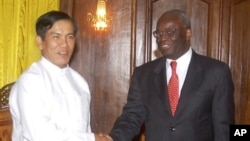Newly disclosed State Department documents show the U.S. sought to have the U.N. Special Envoy on Burma removed from his job. A new batch of classified cables released by the activist website WikiLeaks also documents Chinese frustration with Burma's generals and rumblings about possible North Korean nuclear cooperation with Burma.
In a 2008 cable, then-Secretary of State Condoleeza Rice asked the U.S. Mission to the United Nations to request the removal of Ibrahim Gambari as the Secretary-General's Special Representative to Burma.
In a set of talking points to be conveyed to Secretary-General Ban Ki-moon or his deputy, the cable asked for Gambari's "graceful" termination from office.
It cited what it called Gambari's complete lack of progress on critical issues in Burma, namely, dialogue between the government and the opposition, particularly Aung San Suu Kyi, and release of political prisoners. It says some of the failure to achieve progress was attributable to regime intransigence, but that Gambari did not press the generals as forcefully as he might have, and that he was unrealistically upbeat about prospects for change in Burma.
Gambari was reassigned one year ago as head of the U.N.-African Union peacekeeping mission in Darfur.
The cable also cites a loss of confidence in Gambari by Burma's democracy movement. Opposition leaders had in fact often criticized Gambari as ineffective in advancing the cause of human rights.
Contacted in Darfur by VOA, Gambari refused to directly comment on the cable. However, he points out that he remained in his post for another year and a half after Secretary Rice's request before moving on to a more high-profile job. He also claims partial credit for Aung San Suu Kyi's release from house arrest last month, saying it was directly due to groundwork he had laid in his meetings in Burma, also known as Myanmar.
"It is very clear that that was in part the outcome of a lot of work that was done before then [the release], including, as you know, eight meetings between me and her on eight different occasions, and 10 meetings with the senior leadership of Myanmar," said Gambari.
The cable was one of the latest in a series of diplomatic communications obtained and released by WikiLeaks.
Another leaked cable, dated January 18, 2008, says China has also been losing patience with Burma's rulers. It quotes the Chinese ambassador to Burma as saying the generals' intransigence is making a bad situation worse. The ambassador told the U.S. charge' d'affaires that fear of losing power and economic interests may be what is keeping the generals away from the negotiating table.
A July 2008 cable offers a sobering view of both the government and the opposition. It says the generals keep their hold on power through a vast system of economic patronage that it likens to the Mafia. The cable says that rumors of splits at the top of the military government come from what it calls uninformed analysis and wishful thinking by Burmese exiles and outside observers. The cable says while there are some disagreements, the generals stick together out of self-interest.
But there are also splits in the Burmese democracy movement. The cable says that while Aung San Suu Kyi remains immensely popular, her party, the National League for Democracy (NLD), does not share the same status. It says a younger generation is frustrated with a party that is strictly hierarchal and controlled by elderly activists who fail to listen to the ideas of their youthful comrades.
Aung San Suu Kyi was freed from a seven-year-long house detention last month after elections. Her party boycotted the elections, which critics say were engineered to ensure a majority for the generals. However, that decision was criticized by some of the younger party members, and some disaffected young activists split from the NLD and did participate.
The WikiLeaks documents also raise the issue of possible North Korean nuclear cooperation and missile program assistance to Burma. However, nothing in the cables offers any hard confirmation of those reports.
US Sought Removal of UN Burma Envoy, Leaked Documents Show
- By Gary Thomas




